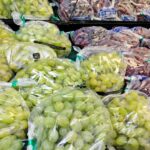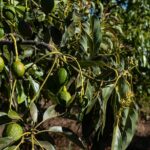Leading Chilean nectarine exporter to make inroads in China

Chile's largest nectarine exporter is planning to significantly increase shipments of the fruit to the newly opened Chinese market, enlisting the help of e-commerce group Alibaba for online sales this upcoming season.
Market access was announced in October 2016 but only finalized in February this year toward the end of the season, so Gesex only shipped limited volumes.
For the 2017-18 season however, the company's general manager for its China operations said that figure would be much higher.
At an event in Shanghai on August 25, Gonzalo Matamala explained the company had opened an office in the Chinese city two years ago in anticipation of securing nectarine market access.
Other produce commodities the company currently ships to the market include cherries, plums and table grapes.
"We were able to send around 40,000 boxes last year towards the end, so it was an interesting volume," he said.
"But next year, since we are the largest and there are certain nectarine varieties that only we own, we expect those varieties to garner positive results in terms of the demand here, especially for the white-fleshed varieties."
In total the company exports around 30 nectarine varieties.
"We have some yellow-fleshed varieties which are very high in sugar and very low in acidity, so we think those varieties will also be very interesting for this market," he said.
"Our competitor Australia didn’t have the right amount of sugar, so we arrived in a very good position with a certain volume."
He added that there would be no competition with domestic nectarines as Chile was a counter-seasonal supplier, and hoped to offer new varieties and flavors to Chinese consumers.
"Even though nectarines are deep-rooted in the Chinese fruit industry...the world has developed new varieties and new products," he said. 
"The consumers here in China will understand that there are sweeter and juicier nectarines."
The lower prices of Chinese nectarines are not expected to be a problem, according to Matamala, describing the local supply as a different product to what Gesex will ship to the market.
He also described local nectarines as being hard with low Brix levels.
"I think the challenge of exporting nectarines is to understand that sometimes nectarines don’t need to be so hard to be eaten," he said.
"Chile used to experience that at the beginning, and it took some time but the Europeans and Americans had developed new varieties, which we planted in Chile. China has fewer varieties planted locally, so maybe their knowledge of the fruit is more concentrated."
He said the first nectarine consignments would arrive in the second half of October and anticipated prices of around RMB200 (US$30) per box, which was the approximate price of the first shipment from last season.
The season is expected to last eight to nine weeks.
Gesex last year hosted a visit by Alibaba representatives in order to established an agreement to sell fruit through their channel.
"We met them two days ago again in order to finalize the talks," he said on Friday.
"We are planning to have some high quality, high Brix varieties that only we own to be sold on the channel, so the final consumer may only eventually be able to get these varieties via Alibaba. And we are open to see and explore other opportunities in terms of e-commerce."
He said the percentage of fruit sold on e-commerce websites depended from year to year, but the bulk of the special varieties would likely be marketed there due to their higher prices.
"The remaining will maybe go to retailer stores and specialty fruit shops so these varieties are still within the reach of consumers," Matamala said.
"The other good-quality products which are stable in volume and quality will still go to supermarkets and wholesale markets."
Earlier this year, Chilean Fruit Exporters' Association general manager Miguel Canala-Echeverría estimated half of Chile’s seven million boxes of nectarines it exports annually would go to China for the 2017-18 season, with white-fleshed varieties representing the majority of volumes.














































